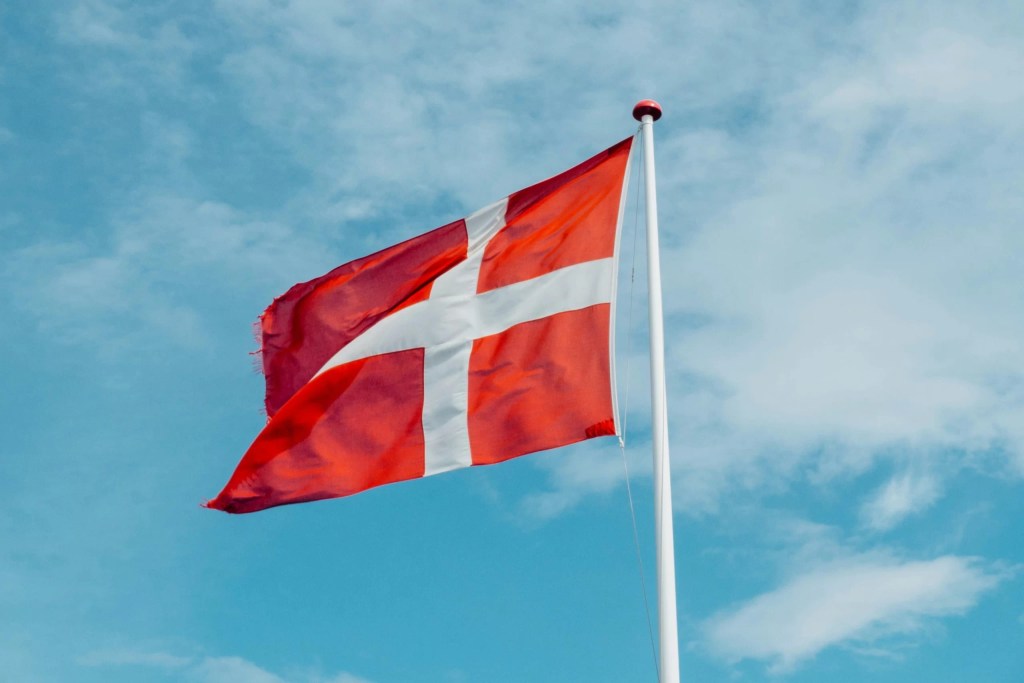
This article is apart of our weekly series associated with the The Global Subsidiary Index. The series is designed to help businesses identify the best countries for establishing a subsidiary based on key operational factors. GEOS provides a data-driven ranking of jurisdictions worldwide, assessing across 40+ criteria to bring you insights into global expansion opportunities.
Each country on the index is scored on an overall score out of 100, with each individual criterion out of 5 or 10. Higher scores indicate a more favorable environment for businesses. By leveraging these insights, companies can make informed decisions on where to establish a legal presence.
Starting a company in Denmark puts you in one of Europe’s most digitized economies, backed by top-tier IT infrastructure and a tech-savvy population. Around 85% of citizens are online, and all dealings with public authorities happen digitally.
The country helped shape global software, producing languages like C++, Turbo Pascal, and Visual Prolog. Today, it’s talent leads in AI, cybersecurity, robotics, and more. Denmark’s connected society makes it a perfect test market, where consumers adopt and improve new tech fast.
It’s this mix of innovation, infrastructure, and agility that makes Denmark a smart choice for global expansion, especially with GEOS guiding the way.
Introduction to Denmark
Denmark combines a strong social welfare system with a pro-business climate. It’s one of the best places in Europe to start and grow a company.
Whether you’re a foreign investor or self-employed, you’ll find a cost-efficient, flexible setup for launching and scaling. The country’s long trading history, skilled workforce, and high English proficiency make it easy to connect and operate.
Add in reliable infrastructure, steady electricity, clean water, and a solid financial system, and you’ve got a stable base for business. For companies aiming to establish a European presence, starting a company in Denmark is a smart choice.
The first platform dedicated to streamlining entity setup and management.
Market Research and Analysis
Before you get started, know the market. Research in Denmark means understanding your audience, checking out competitors, and spotting trends.
The Danish Business Authority offers plenty of tools and resources to guide your decisions. You’ll also benefit from efficient transport and reliable communications across the country.
With solid research and the right insights, you can enter the market with confidence and plan for steady growth.
Why Should You Expand to Denmark?
There are a number of reasons why starting a company in Denmark is a smart move.
A Hub of Innovation, Stability, and Sustainable Business
Denmark combines innovation, stability, and a pro-business climate. It’s a strong base for expanding into Europe. The GEOS Global Subsidiary Index score of 64.4 reflects both opportunity and reliability. A GDP per capita score of 8/10 shows a healthy economy and high consumer spending power. Political stability is unmatched, with a perfect 5/5 risk score.
Sovereign risk is “AA” and political risk is “AAA.” That signals a safe, well-managed economy. Global rankings reinforce the point: tenth in the World Economic Forum’s 2019 Global Competitiveness Report, fourth in the World Bank’s 2020 Doing Business ranking, and seventh in the EIU 2019 Democracy Index.
Infrastructure is another advantage:
- Energy security: The power grid connects to Norway, Sweden, and Germany, creating built-in backup and reserve capacity.
- Digital access: Broadband covers 98% of the country, and most transactions with banks or government happen online.
The government’s push for digitalisation keeps business operations efficient. For companies entering Europe, Denmark offers economic strength, political security, and dependable infrastructure in one package.
Attractive Tax & Regulatory Framework
Denmark’s tax and regulatory setup is competitive and transparent. The corporate tax rate is 22%, giving it a Corporate Tax Rate Score of 6/10. It’s moderate and works well for long-term planning.
The system uses a territorial approach. Danish companies pay tax only on income earned in Denmark. Non-resident companies are taxed only on local profits. While oil, gas, and shipping have special regimes, most businesses follow the standard CIT rules.
Foreign investors find the rules clear. Denmark scores 8/10 for openness to foreign UBOs. Registration happens online through the Central Business Register.
The CVR register allows users to find information about a company’s legal ownership, management, and registration history. It also provides an overview of a company’s legal status and other key details. Companies must keep details current to avoid penalties.
Digital services make administration easy. With a Government Portal Sophistication Score of 4/5, platforms like virk.dk and the MitID digital key let companies handle filings and updates quickly and securely.
Key points:
- Moderate tax rate – 22% standard CIT, with targeted rules for certain sectors.
- Foreign ownership friendly – Simple, online UBO registration for all owners.
- Strong digital tools – Secure portals streamline compliance and communication.
- CVR number usage – For example, a CVR number is required when exporting goods to verify a company’s legal identity in international trade or to find information about a business’s registration and ownership.
This mix of predictable taxes, investor-friendly rules, and efficient digital systems makes Denmark a smart choice for global expansion.
Registering with the Danish Business Authority
Starting a business in Denmark is straightforward, but you need to follow the rules. You can register as a limited liability company (ApS or A/S), partnership, or sole proprietorship.
You’ll need a Danish social security number (CPR) and a Danish eID ‘MitID’—or an approved foreign eID under the eIDAS framework. Make sure to submit your VAT registration at least eight days before starting business activities.
This keeps you compliant and avoids fines. With the right documents, registration is quick and smooth.
Workforce & Employment Landscape
Denmark’s workforce is skilled, adaptable, and supported by a flexible labor model. Employment rules score 6/10 for complexity, so compliance takes care. Recruiting is efficient, scoring 8/10. Salaries are high, with just 2/10 on benchmarking. Unions have moderate influence, at 3/5.
The “flexicurity” model blends easy hiring and dismissal with strong social security. Notice periods are short. Severance is limited. Benefits are generous. Unemployment is low at 2.9%, though some sectors face skill gaps. The talent pool is well educated and highly specialized.
The Danish workplace is known for its informal culture, where teamwork and collaboration among colleagues are highly valued. Hierarchies are relaxed, and colleagues often interact informally, sharing ideas and working together to maintain order and structure within the workplace.
Around 65% of employees belong to unions. Pay and conditions are often set through collective agreements. Companies need to decide early on whether to join an employer organization.
Recent updates include new rules on employment terms, bans on restricting side jobs, stronger whistleblower protections, sexual harassment prevention duties, and working time tracking requirements.
Key points:
- Moderate complexity – Collective agreements are common but manageable.
- Strong talent pool – Skilled workforce and low unemployment.
- High costs – Salaries and pensions need careful planning.
- Union presence – Moderate but influential.
With smart planning, businesses can manage costs and benefit from Denmark’s flexibility, skills, and stable labor environment.

Incorporation & Compliance Essentials
Starting a company in Denmark is quick and efficient. The official timeline is one to two months. In practice, an ApS or A/S can be registered within hours once documents and share capital are ready.
Branches must register and pay Danish corporate tax. Representative offices can only do limited activities. They usually don’t need to register or pay local tax.
Key points:
- Fast process – Often completed in hours once requirements are met.
- Simple paperwork – No notarization needed.
- Resident director – Not always required, but local expertise helps.
- Registered address – Easy to arrange.
Denmark’s system is digital, straightforward, and business-friendly. Governance rules still need careful attention.
Obtaining a CVR Number
A CVR number is your business’s unique ID in Denmark. It works like a CPR number for individuals and is required for transactions with suppliers, customers, and partners.
You’ll receive it when you register with the Danish Business Authority. The CVR register lists important details like ownership, management, and business purpose.
Having your CVR number in place means your business is officially recognized and avoids mix-ups when dealing with others.
Financial & Operational Insights
Denmark has a strong and reliable financial system. Banks process about DKK 732 billion in payments each day. TARGET DKK links banks, payment networks, and international systems for fast, secure transfers. Retail payments run through TIPS for instant transfers and Batch Clearing for same-day or overnight settlements.
Expense management scores 3/5. The rules are clear but detailed, so they need careful handling. Operating costs score 6/10, giving some room in the budget, though salaries and compliance costs can be high. In-person requirements score 2/5, as banking and some admin tasks still need a visit before most processes move online.
Key points:
- Robust payments network – Fast, secure, and well-connected.
- Clear expense rules – Manageable with oversight.
- Reasonable costs – Some higher expenses to plan for.
- Initial in-person needs – Mostly for banking.
Starting a company in Denmark gives you financial strength, efficiency, and digital access, making it a solid base for operations.
Immigration & Work Permits
Denmark’s immigration process is clear but requires detailed paperwork, scoring 3/5 for complexity.
Work permits are available under several well-defined schemes. A work permit allows you to carry out specific work activities for a designated employer or business in Denmark, but does not permit you to work in other countries or take on additional employment outside the terms of your permit.
The Fast-track Scheme lets certified companies hire quickly. The Pay Limit Schemes and Positive Lists focus on high-salary roles and shortage occupations. Other options include permits for researchers, PhD candidates, specialised talent, service providers, agricultural workers, trainees, and entrepreneurs under Start-up Denmark.
Many schemes also extend to family members, allowing them to apply for their own work permits. Applications go through SIRI and usually move smoothly when all documents are in order. It is important to know the start date of your permit and the period for which it is valid, as this affects your rights and obligations in Denmark.
A processing fee is required for most applications, but some applicants may be exempt from paying the fee based on specific criteria; for instance, certain researchers or students may qualify for exemption.
All required fees must be paid and documented as part of the application process. Note: there is a strict time limit for submitting your biometric data (such as facial photo and fingerprints) after submitting your application, so be sure to complete this step promptly to avoid delays.
- The Fast-track Scheme allows certified companies to hire quickly.
- The Pay Limit Schemes are for jobs meeting set salary thresholds.
- The Positive Lists target roles in shortage occupations.
- Specialised permits cover researchers, PhD candidates, and niche talent.
- Start-up Denmark supports innovative entrepreneurs launching businesses.
- Danish language lessons are typically offered to foreign nationals with residence permits.
With the right scheme and complete paperwork, starting a company in Denmark is straightforward.

Regulatory & Compliance Considerations
Denmark’s compliance rules are detailed but manageable with the right support. Compliance reporting scores 3/5. Data protection scores 4/5 under GDPR and the Danish Data Protection Act.
The Danish Bookkeeping Act sets strict digital accounting requirements. Companies must use e-invoicing in OIOUBL or Peppol, keep SAF-T file capability, maintain audit trails, store invoices digitally, and back up data weekly within the EU.
The rules apply in stages: approved ERP systems since July 2024, non-approved systems from January 2025, and all qualifying entities from January 2026.
E-invoicing in OIOUBL or Peppol is required for certain transactions. Full SAF-T reporting is expected by 2028. GDPR applies to Danish companies and some non-EU businesses, with strong privacy and security standards.
Key considerations:
- Use digital bookkeeping with EU-based backups.
- Meet e-invoicing rules and prepare for expanded SAF-T.
- Follow strict GDPR-aligned data protection laws.
With the right systems in place, expanding your company in Denmark can be relatively straightforward.
Talent Availability & Scaling Considerations
Denmark has a strong talent pool across key business areas, making it easier for companies to scale.
- Developers – 4/5. Skilled tech professionals are widely available, supported by a culture of innovation, advanced digital infrastructure, and strong STEM education. Many also bring international experience, which is valuable when building products for global markets.
- Marketing – 4/5. Creative talent is plentiful, with professionals experienced in both local and international markets. They excel in digital marketing, brand building, and campaign management, often with a strong focus on sustainability-driven branding that resonates in Denmark and across Europe.
- Sales – 4/5. Sales professionals are strong in consultative selling, relationship management, and complex B2B deals. Many have worked across the Nordic region and wider Europe, giving them valuable insight for companies targeting regional growth.
- Finance – 4/5. Finance experts bring solid skills in accounting, compliance, and strategic planning. They’re familiar with international reporting standards and understand the regulatory demands of operating in multiple markets.
With this depth of expertise, companies can build capable teams locally. Only niche or highly specialised roles may require recruitment from abroad.
Unique Denmark Expansion Insights
Expanding your company in Denmark brings big opportunities and a few setup challenges.
- Sustainability focus – Denmark is a global leader in renewable energy and green innovation. Sustainability shapes energy, construction, transport, and waste management. Companies in cleantech, green building, or eco-focused sectors will find strong demand and established local partners like Rockwool, Danfoss, and Grundfos.
- Innovation and startup ecosystem – Copenhagen and Aarhus are lively hubs for startups and tech. Businesses can access accelerators, incubators, pitch events, and funding from Innovation Fund Denmark or The Danish Growth Fund. The talent pool is strong, digital adoption is high, and the culture encourages collaboration.
- Restaurants and gastronomy – Denmark is known for its high-quality restaurants and internationally renowned chefs, making it a hub for world-class cuisine and culinary innovation.
- Food safety – Danish food products are recognized for their safety and high hygiene standards, which contribute to their strong international reputation and trustworthiness.
- Business culture – Danish companies value flat structures, open communication, and consensus. Trust and transparency are core. Work-life balance is important. Decisions may take longer, but they usually lead to stronger commitment and better outcomes.
- Banking and setup challenges – Opening a bank account can be slow for foreign companies. It often requires detailed paperwork and in-person meetings. Starting early and working with local advisors helps.
Denmark offers a green-first market, a thriving innovation scene, and a collaborative business culture. Align with local values, use the startup network, and plan ahead for tasks like banking.
Finding Additional Information
If you need additional information about conducting business in Denmark, setting up a limited liability company, or obtaining a CVR number, the Danish Business Authority is your primary point of contact. Their website offers extensive guidance on company registration, compliance, and business management.
The Danish Tax Agency (SKAT) also provides essential information on taxes, duties, and compliance requirements for businesses in Denmark. The Danish government supports new businesses with a range of benefits and services designed to help you establish and grow your company in the country.
For the best results, consider consulting with a professional advisor or reaching out directly to the relevant authorities. This ensures you comply with all rules and regulations, making your entry into the Danish market as smooth and successful as possible.
How GEOS Simplifies Your Expansion into Denmark
GEOS makes expanding your company in Denmark easy. We take care of entity setup, compliance, regulatory guidance, and operational support. You can focus on growth while we handle the details.
AI-Powered Global Expansion Support
You’ll also have Geovanna, our AI-powered digital assistant. She keeps your incorporation and compliance moving smoothly. She helps you navigate local rules and avoid unnecessary delays.
Is Denmark the Right Fit for Your Business?
Denmark scores 64.4 on the GEOS Global Subsidiary Index. It’s innovative, well-regulated, and committed to sustainability. It’s a strong choice for businesses ready to scale.
📩 Contact GEOS for a customized expansion strategy!
This article does not constitute legal advice.




